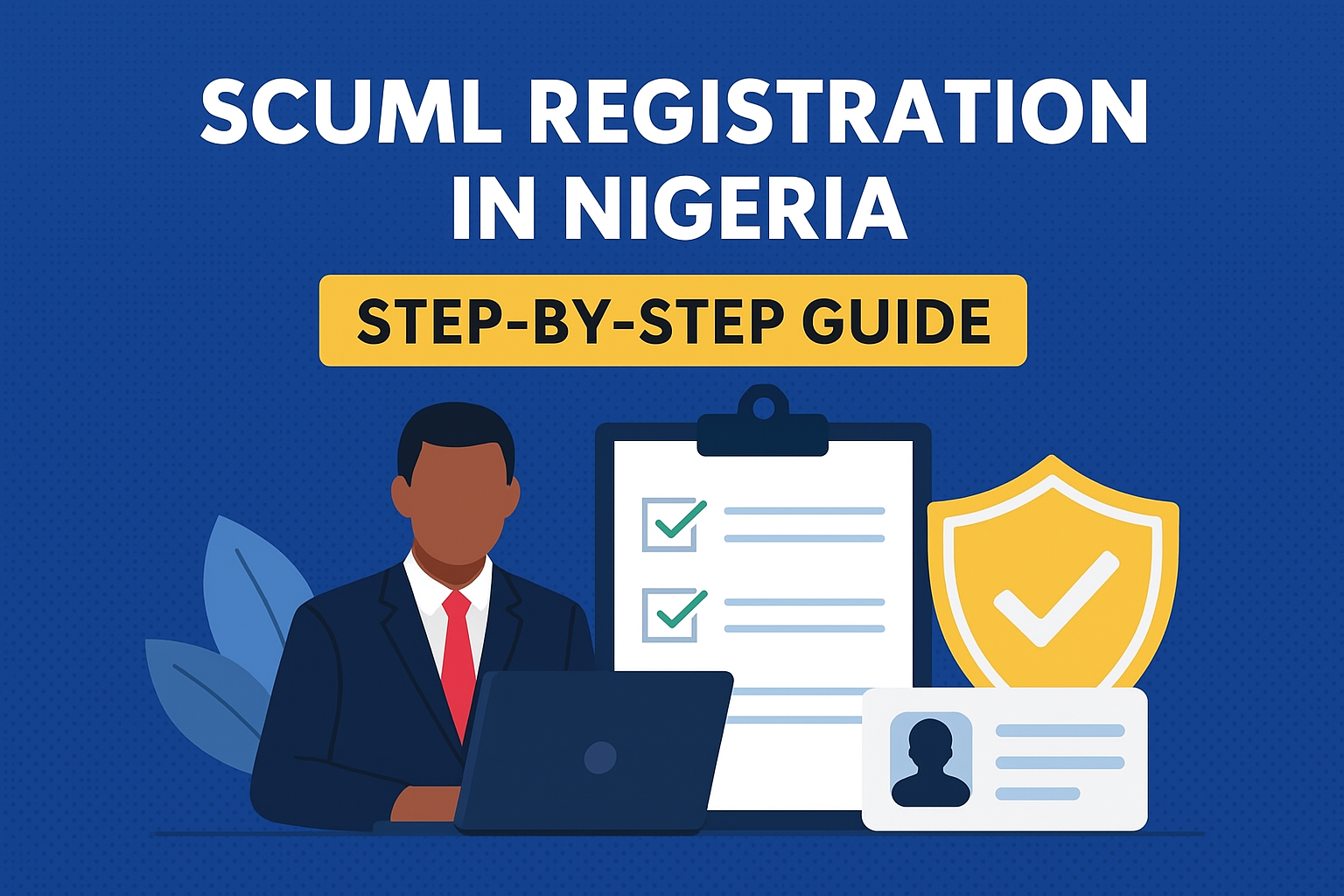In Nigeria, compliance with regulatory requirements is a critical aspect of running a legitimate and sustainable business. One such important requirement is the SCUML registration. The Special Control Unit Against Money Laundering (SCUML) was established under the Economic and Financial Crimes Commission (EFCC) to monitor, regulate, and supervise businesses that fall under the Designated Non-Financial Businesses and Professions (DNFBPs) category.
Whether you are a business owner, consultant, or professional service provider, registering with SCUML is mandatory if your business activities fall within the DNFBP category. This step-by-step guide explains what SCUML is, why it is important, the benefits, and the complete process of registration in Nigeria.
What is SCUML?
SCUML stands for the Special Control Unit Against Money Laundering. It was established in 2005 in line with the provisions of the Money Laundering (Prohibition) Act of 2004 and is supervised by the EFCC.
The unit’s primary role is to:
- Register and regulate Designated Non-Financial Businesses and Professions (DNFBPs).
- Monitor financial transactions to prevent money laundering and terrorism financing.
- Enforce compliance with Nigeria’s anti-money laundering (AML) and counter-terrorism financing (CTF) regulations.
If your business belongs to the DNFBP category, registration with SCUML is compulsory before you can open a corporate bank account or perform regulated business transactions.
Who Needs SCUML Registration in Nigeria?
Not all businesses are required to register with SCUML. Only Designated Non-Financial Businesses and Professions (DNFBPs) are mandated to register. These include:
- Dealers in Jewellery
- Real Estate Developers and Agents
- Hotels and Hospitality Businesses
- Dealers in Luxury Goods
- Dealers in Cars and Automobiles
- Dealers in Precious Stones and Metals
- Charities and Non-Governmental Organisations (NGOs)
- Law Firms and Notaries Public
- Accounting Firms
- Audit Firms and Tax Consultants
- Estate Surveyors and Valuers
- Trust and Company Service Providers
- Supermarkets and Casinos
If your company falls into any of the above categories, then SCUML registration is mandatory.
Read also: How to Register a Company in Nigeria (2025): Step-by-Step CAC Guide
Why is SCUML Registration Important?
SCUML registration is not just a regulatory requirement—it plays an essential role in business legitimacy and financial compliance. Some of the key reasons why SCUML registration is important include:
1. Opening a Corporate Bank Account
Most banks in Nigeria require a SCUML certificate before opening or maintaining corporate accounts for DNFBPs. Without SCUML, your company may face restrictions.
2. Regulatory Compliance
It ensures compliance with Nigeria’s Money Laundering (Prohibition) Act and EFCC regulations. Failure to register may result in penalties, fines, or suspension of business operations.
3. Transparency and Trust
Having SCUML certification boosts credibility and trust with clients, partners, and regulators. It shows your business is transparent and committed to ethical practices.
4. Business Continuity
Without SCUML, your company could face interruptions, especially when dealing with financial institutions or government contracts.
Step-by-Step Guide to SCUML Registration in Nigeria
Here’s the practical step-by-step process of SCUML registration for businesses in Nigeria:
Step 1: Confirm Eligibility
Check if your business falls under the DNFBP categories. If yes, you are required to register.
Step 2: Gather the Required Documents
To begin the registration, prepare the following documents:
- Certificate of Incorporation from the Corporate Affairs Commission (CAC).
- Company’s Memorandum and Articles of Association (MEMART).
- Form CAC 2 (Return of Allotment of Shares) and Form CAC 7 (Particulars of Directors).
- Business Profile of the company.
- Tax Identification Number (TIN).
- Company’s Utility Bill (proof of office address).
- Means of Identification of directors (International Passport, Driver’s License, or National ID).
- Company’s Email Address and Phone Number.
For NGOs, additional documents may include the Constitution of the Organisation, Board Resolution, and Certificate of Incorporation as an Incorporated Trustee.
Step 3: Visit the SCUML Registration Portal
Go to the official SCUML website: https://scuml.org
Click on “Register” and choose the category that applies to your business (Company or NGO).
Step 4: Fill in the Online Registration Form
Provide accurate information about your company, including:
- Company name and CAC registration details.
- Business category (select the appropriate DNFBP).
- Contact details.
- Nature of business.
Step 5: Upload Required Documents
Scan and upload all required documents in PDF format. Ensure that documents are clear and legible.
Step 6: Submit Application
Review your details carefully and click “Submit”. You will receive a confirmation message and a tracking number.
Step 7: Verification and Approval
SCUML officials will review your application and documents. If successful, you will be notified by email.
Step 8: Issuance of SCUML Certificate
Once approved, you will be issued a SCUML Certificate of Registration, which serves as proof of compliance.
How Long Does SCUML Registration Take?
The duration for processing a SCUML registration may vary, but typically it takes between 2 to 4 weeks, depending on document accuracy and workload at the SCUML office.
Cost of SCUML Registration in Nigeria
One of the advantages of SCUML registration is that it is free of charge. Businesses are not required to pay any registration fees. However, there may be administrative costs involved in obtaining and scanning the required documents.
Common Challenges in SCUML Registration
Some businesses face difficulties during registration. The most common issues include:
- Incomplete Documentation – Missing CAC forms or MEMART may delay processing.
- Incorrect Business Category – Choosing the wrong DNFBP category can result in rejection.
- Unclear Scanned Documents – Poor quality scans often lead to application delays.
- Delayed Approvals – Due to high application volumes, processing may take longer than expected.
Benefits of Completing SCUML Registration
- Access to Banking Services – Open and maintain corporate bank accounts easily.
- Regulatory Protection – Avoid penalties and legal sanctions.
- Business Opportunities – Qualify for government and private sector contracts that require compliance.
- Enhanced Reputation – Demonstrates professionalism and regulatory compliance.
- Global Credibility – Positions your business as compliant with international anti-money laundering standards.
Frequently Asked Questions (FAQs) on SCUML Registration
1. Is SCUML registration compulsory?
Yes. If your business falls under the DNFBP categories, SCUML registration is mandatory.
2. Can I open a bank account without SCUML?
Most Nigerian banks now require SCUML certification before opening a corporate account for DNFBPs.
3. How much does SCUML registration cost?
It is free of charge.
4. Can I register SCUML online?
Yes. Registration can be completed on the official SCUML portal: https://scuml.org.
5. How long does it take to get an SCUML certificate?
On average, between 2 to 4 weeks, depending on document accuracy.
Conclusion
SCUML registration is an essential compliance requirement for businesses in Nigeria that fall under the DNFBP category. It not only ensures regulatory compliance but also boosts credibility, grants access to financial services, and enhances business opportunities.
By following the step-by-step guide in this article, you can complete SCUML registration in Nigeria without unnecessary delays.
If you are unsure of the process or face challenges, consider consulting a business compliance expert to assist you.







